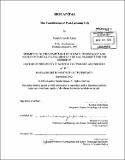| dc.contributor.advisor | Michael M.J. Fischer. | en_US |
| dc.contributor.author | Sunder Rajan, Kaushik, 1974- | en_US |
| dc.contributor.other | Massachusetts Institute of Technology. Program in Science, Technology and Society. | en_US |
| dc.date.accessioned | 2005-09-26T19:24:46Z | |
| dc.date.available | 2005-09-26T19:24:46Z | |
| dc.date.copyright | 2002 | en_US |
| dc.date.issued | 2002 | en_US |
| dc.identifier.uri | http://hdl.handle.net/1721.1/28258 | |
| dc.description | Thesis (Ph. D.)--Massachusetts Institute of Technology, Program in Science, Technology and Society, 2002. | en_US |
| dc.description | Includes bibliographical references (p. 485-497). | en_US |
| dc.description.abstract | (cont.) In the process, this thesis intervenes in social theoretical debates not simply around the nature and production of knowledge and value, but also around the place of larger belief-systems - relating to religion, nation and ethics - in such productive enterprises. It simultaneously intervenes in conceptual debates within cultural anthropology regarding methodological questions that surround the undertaking of comparative ethnographic projects of powerful sites of knowledge production and value generation in a globalized world. | en_US |
| dc.description.abstract | This thesis is concerned with tracking and theorizing the co-production of an emergent technoscientific regime - that of biotechnology in the context of drug development - with an emergent political economic regime that sees the increased prevalence of such research in corporate locales, with corporate agendas and practices. Hence biocapital, which asks questions of the implications for life sciences when performed in corporations, and for capitalism, when biotechnology becomes a key source of market value. The methodology followed in this dissertation is multi-sited ethnography. I study a range of actors - including academic and industrial scientists, entrepreneurs, venture capitalists and policy makers - in two distinct national environments, the United States and India, as they shape and come to terms with these emergent technologies and emergent political economies. I attempt, through such a study, to theorize biocapital, drawing primarily upon Marxian and Foucauldian understandings of life, labor and value, and upon literature in Science and Technology Studies, that has constantly drawn attention to the constructed, contingent and politically consequent nature of technoscientific activity. | en_US |
| dc.description.statementofresponsibility | by Kaushik Sunder Rajan. | en_US |
| dc.format.extent | 497 p. | en_US |
| dc.format.extent | 33273356 bytes | |
| dc.format.extent | 33343692 bytes | |
| dc.format.mimetype | application/pdf | |
| dc.format.mimetype | application/pdf | |
| dc.language.iso | en_US | |
| dc.publisher | Massachusetts Institute of Technology | en_US |
| dc.rights | M.I.T. theses are protected by copyright. They may be viewed from this source for any purpose, but reproduction or distribution in any format is prohibited without written permission. See provided URL for inquiries about permission. | en_US |
| dc.rights.uri | http://dspace.mit.edu/handle/1721.1/7582 | |
| dc.subject | Program in Science, Technology and Society. | en_US |
| dc.title | Biocapital : the constitution of post-genomic life | en_US |
| dc.type | Thesis | en_US |
| dc.description.degree | Ph.D. | en_US |
| dc.contributor.department | Massachusetts Institute of Technology. Program in Science, Technology and Society | |
| dc.identifier.oclc | 51928458 | en_US |
